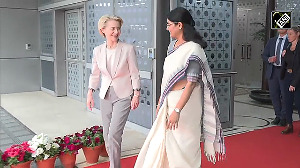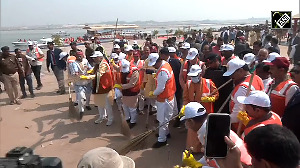America is showing an unprecedented interest in making India a full-fledged military ally in Asia. But India's response to the American request for a full division of 17,000 Indian troops in Iraq has been perceived as a blunt rejection. Given the unique circumstances for both sides, it is imperative that India must formulate its position very carefully and manage the perceptions.
The emerging American interest in India is not due to its love for India, but appears to be pragmatically generated to protect its strategic interests in a dangerous world. The problems faced by America are complex and long term. They require new geopolitical alignments.
Many intellectuals hasten to pre-empt discussions about the 'clash of civilizations,' because they fear that such discussions would be self-fulfilling and lead to dire consequences. But one way to dampen a clash would be to openly discuss the forces at work. Islamic militancy was grossly under-estimated by many intellectuals immediately after 9/11, and even today the madarsas which function as jihad factories are an uncomfortable topic.
There are underlying factors that justify the American insecurity: While Ivy League professors propagate their own notions about Islam, the ground reality is what matters. Islamic ideology as taught in tens of thousands of mosques and madarsas, especially in the non-Western world, does indeed call for Muslims to eventually takeover the world. The clerics, not the college professors, define what the masses believe. The well-intended wishful thinking by Islamic reformists has blurred an honest assessment of the real problem. Oil will remain a critical asset for decades to come, and will fuel these clashes.
Democracy will not be easily achieved in most of the Third World in the foreseeable future. India's democratic success cannot be quickly replicated: It is not simply the result of being a former British colony, because others with a similar historical past (Zaire, Uganda, Kenya, Egypt, Pakistan, UAE, Bangladesh, etc) are not stable democracies the way India is, despite India's challenging socio-political complexity.
Europe can no longer be counted upon as an all-weather ally by America, because it will have its own separate agendas. China looms ahead as yet another threat and contender for global domination.
At the same time, India has many legitimate grounds for fearing retaliation if it became America's military ally: There could be broader pan-Islamic support for Pakistan's sponsorship of jihad terrorism against India. Arab retaliation could impact the huge repatriation of foreign exchange by Indian workers in the Middle East.
There are also other irritants that come in the way. While India strives to become the world's premier outsourcing supplier for high technology and other knowledge workers, Pakistan is already the world's largest outsourcing supplier of jihadis. Nearly everyone implicated in Islamic terrorism since 9/11 received training in Pakistan's jihad training factories. Yet Pakistan continues to hoodwink America concerning its tacit support of cross-border terrorist activities on its Kashmiri and Afghan frontiers. Many Indians felt that America had double standards when it was classifying Kashmir terrorists as 'freedom fighters.' Pakistan used this American ambiguity to expand its jihad training against India, until America later started to classify Kashmir terrorists as such.
Pakistan has successfully used reverse psychology to extort aid from America on the threat that it would otherwise become an even worse perpetrator of terrorism. Blackmail has worked repeatedly, as American policy fails to distinguish between Musharraf and the rest of Pakistan. The latest American aid package to Pakistan is in the amount of $3 billion, 50% of which is to be weapons whose most likely target will be India as on all prior occasions. Scaled for populations and economies, an equivalent aid package for India would have to be eight times larger, or $24 billion. All this pampering of Pakistan by America upsets Indians.
The pan-Islamisation of Indian Muslims' language, culture and identity over the past twenty years, combined with the South Asian identity movement, has given Pakistan the opportunity to claim to speak for Indian Muslims and to try to disunite Indians. India's Muslims need to be nurtured within the context of Indian culture, and Indian Muslim leaders who are proud of their country must be included in such foreign policy decisions.
However, notwithstanding all of the above obstacles, India simply cannot shut off America's request with a simple 'no' as it is perceived to have done. India's formal rejection stated that it would reconsider the issue if the UN approves international troop deployments. However, as an interim measure India should at least send medical and other infrastructure-building services to Iraq.
American thought process is very much based on its corporate culture. Good inter-personal chemistry and media savvy are critical to cultivate a productive relationship -- an area in which General Musharraf and other Pakistani leaders seem to outperform Indian politicians. India should establish a high level negotiating team consisting of individuals with successful experience in senior levels of corporate America. There are many highly qualified Indians with such experience, but India does not seem to be attentive to matters of style. It should learn the psychological profile of each key individual on the American side, and have on its own team those who know how to engender trust. More important than the result is the process; more important than one's decision is how it is promoted.
Indian negotiators should put a well-organised case on the table. Such candour and forthrightness are appreciated in American culture, and this would serve to build long term trust. Any sincere offer from a friend deserves a sincere counter-offer. Rather than appearing to be scolding on ideological grounds, or explaining why it will not work, India's goal should be to try to find a win-win deal.
India should support the American initiatives for an Asian equivalent of NATO with India as a central founder-member, in which an attack (both overt and covert such as cross-border terrorism) on any member state would be treated as an attack on the entire alliance. The alliance could also recognise the Line of Control in Kashmir as the international border. India could ask for a veto over Pakistan's potential membership, to prevent a deadlocked alliance. The Americans could further sweeten the deal by agreeing to formalise its verbal support for India's bid for a permanent seat in the UN Security Council, and also accept India as a de facto nuclear weapons state. Military sales and trade on a most favoured-nations basis could also be on the table.
In return, India could offer more than just one division of troops in Iraq. India's very large and sophisticated military could expand its range of assistance to the Americans in Asia, gaining experience and building relationships -- from patrolling the high seas, escorting ships, satellite monitoring, to refuelling and repairing ships and heavy equipment. Just as any outsourcing supplier has a per month price list for supplying various levels of manpower and equipment, India could negotiate compensation on a cost-plus basis, a concept that Americans respect.
Alliances must be founded on mutual respect for one another's culture and civilisation. America should upgrade the way India and its culture are represented -- or rather misrepresented -- in its media and education. This portrayal eventually plays into think tanks, corporate decision-making and the general outlook of the American public. Today's images of India focus on human rights issues, dowry, sati, and misrepresent Hinduism as being world negating, irrational and the cause of all evils. Many Indian-Americans have joined this institutionalised India-bashing for personal gain. They equate occasional domestic communal violence in a pluralistic nation state (India) with cross-border terrorism (by Pakistan), and thereby give Musharraf a pass while increasing pressure on India.
In this regard, the US State Department could play a pivotal role, as it funds South Asian studies across American campuses, and the tone set by it trickles down and becomes institutionally entrenched in American intellectual life. In short: the India of caste, cows and curry theories cannot expect to sustain a long term alliance with America. Changing this would be challenging but critical.
To ensure broad support, India's ruling party should also bring in advisors from the Opposition. While the dialogue should start in earnest soon, no formal alliance should be anticipated prior to India's elections in 2004. Any deal should be ratified by the US Congress and the Indian Parliament. Americans and Indians are keen to comply with formal contracts, and ratification is important in the light of the unpredictable election outcomes in the long run in both countries.
Given so many positive qualities shared by America and India -- democracy, multiculturalism, pluralism, science and technology-driven agendas of the government and business -- such a realignment holds great promise. As America diversifies beyond European culture, India could be its most promising non-Western ally. India's leaders must bring in fresh talent on their team from the corporate sector, because they have experience in 'the art of the deal.'
Unlike other non-Western countries where commercial deals are often instant, there has been a long gestation period for doing business in democratic India. But as most American firms invested in India confirm, the rewards in India have been larger and sustained over longer periods. Similarly, a systematic approach to the proposed alliance would take months to bear fruit. This would demand serious time and energy from both sides. Meanwhile, a quick 'yes' or 'no' is simply not good enough, given that what is at stake is the future geopolitical map of the world.
Rajiv Malhotra works for the Infinity Foundation in Princeton, New Jersey. This is the first column he will contribute fortnightly to rediff.com






 © 2025
© 2025